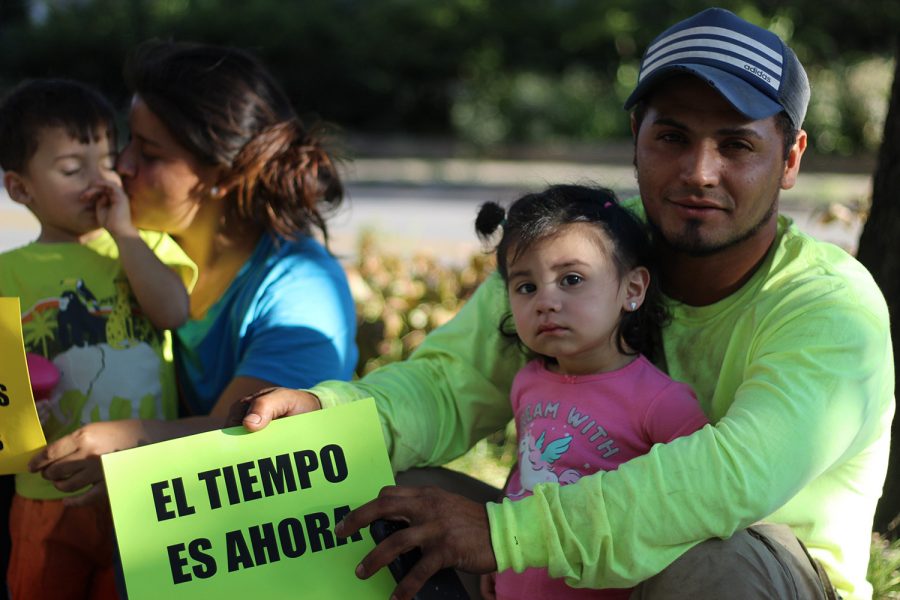Editorial | It’s time for an excluded workers fund
People left out of federal COVID-19 funding need relief, and our local governments have the means to provide it.
Protesters hold their kids close outside the Iowa City Senior Center while pushing for pandemic relief Tuesday, Sept. 7, 2021.
September 21, 2021
Johnson County governments have an opportunity to set an example for the country by taking bold action with their American Rescue Plan funding and creating a fund for excluded workers.
The pandemic, still raging 18 months after the first cases of COVID-19 popped up in Iowa, has placed a strain on all of us. But the damage has been particularly bad among those already disadvantaged in society — undocumented immigrants, formerly incarcerated individuals, and other cash-only workers not considered part of the formal economy.
These workers — the backbone of much of America’s food service, supply chains, and other sectors — fell through the cracks of federal COVID-19 relief disbursements.
Undocumented immigrants without social security numbers have been left out of essentially all federal COVID-19 relief. Though they work, pay taxes, and live in our communities, they received none of the stimulus checks and expanded unemployment insurance that most American workers depended on.
The numbers
Johnson County will receive $29.36 million from the American Rescue Plan, the first half of which it has already. Iowa City will receive $18.33 million, and the rest of Johnson County’s governments will receive around $8 million, according to the state’s coronavirus website.
Guidelines for the funds give broad discretion to local governments to spend the money as they see fit.
And Johnson County certainly has money to go around — the funding is almost a quarter of the county’s total planned expenditures for fiscal 2022, and county officials called it a “historic” amount of money earlier this month.
County and city leaders are already deciding on where to spend this money, and creating that fund should be at the top of the list for local leaders.
While the money could be spent on infrastructure or making up lost revenue, the best way to help the most vulnerable residents of the county is by putting cash in their pockets. Poverty fell almost 2 percentage points nationwide last year as a direct result of government aid, and it’s time to include in the equation those who were initially left out.
Excluded, but essential
Many of the most essential jobs in Iowa are filled by undocumented workers. In fact, 31 percent of the immigrant population and close to 2 percent of the state’s total population was undocumented in 2016, according to the Pew Research Center.
As a heavily agricultural state, Iowa relies on seasonal and migrant farmworkers to feed the nation. While estimates of how many farm workers are undocumented vary, the National Immigration Forum estimates they make up about 70 percent nationally.
Immigrants, some undocumented, also make up a large portion of the workers at the meatpacking plants that became hotbeds of COVID-19 infection in 2020. This happened in Waterloo, Iowa, where the virus swept through the Tyson workplace because managers downplayed the virus and didn’t implement COVID-19 precautions.
Iowa Gov. Kim Reynolds cited the importance of these plants to the country’s food supply when she forced them to stay open as hundreds of workers got sick. When the plants did eventually close, those without documentation were left out to dry, unable to seek government aid.
To protect these members of our community, we need to make the generous federal aid that most others benefited from available to them.
Outreach for distribution
After the fund is set up, local officials need to develop robust outreach strategies and make applying easy, to make sure the money goes to those who need it most.
New York, which opened a $2.1 billion excluded-workers fund in August, already made mistakes that the county and city can learn from.
New York’s system requires undocumented people applying for the fund to provide multiple proofs of identity, a letter from their employer testifying to their loss of income during the pandemic, and several other cumbersome documents.
While it’s important to make sure the money gets in the right hands, requiring government documents to access a fund for people who largely do not have those documents will just leave out already excluded workers. And the power imbalance between an undocumented worker and their employer would likely make them hesitant to ask for a signed letter.
Local governments also need to make sure news of the fund is getting to the right people, and that they’re encouraged to apply.
Many undocumented people speak little or no English, and may not have access to the information channels the county and city would use to publicize the fund. And many are, rightly, hesitant to engage in any government program for fear of negative consequences.
Officials should work with local nonprofits, like the Iowa City Catholic Worker House, to identify people most in need and bring the resources to them.
We are at a pivotal moment as a community. Though these workers have been neglected so and left out so far, we have the opportunity and the means to help them — what remains to be seen is if our leaders have the political will to make that a reality.
Editorials reflect the majority opinion of the DI Editorial Board and not the opinion of the publisher, Student Publications Inc., or the University of Iowa.
Editorial board members are Caleb McCullough, Rylee Wilson, Josie Fischels, Hannah Pinski, Shahab Khan, and Sophie Stover.



